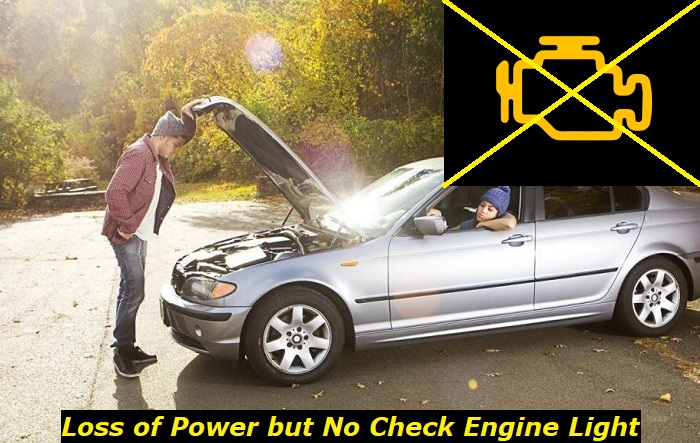If your vehicle lost power and there is still no check engine light, look at the fuel pressure, air intake, MAF sensor, injectors' health, and issues with the exhaust system. These are the most common reasons why the engine may lose power without lighting up the CEL. Also, this can be because of the natural tear and wear of the engine.
Engine power problems highlights
- Level of urgency:Medium
- DIY inspection:Possible but may be complicated
- DIY repair:Sometimes, possible
- Cost of repair:$200 - $650
- Can you drive?In most cases, yes
- Commonreasons:A largelist of reasons, including fuel and air supply, electronics, glitches, but not limited to those.
- Ways to fix:Use code scanner to locate the problem and solve it

What are the symptoms of power loss?
Your car may lose power with all kinds of different symptoms. First of all, it can happen unexpectedly and quickly. You are driving from work to home full of enthusiasm about the Friday evening with your family but suddenly the car starts freaking out in the middle of the road and all your joy is gone.
Or it may happen slowly, day by day. You just notice sometimes that the car is acting weirdly but you can keep on driving, anyway. On one bad day, you suddenly notice that the vehicle just doesn't want to start and it is very hard to accelerate.
Also, your problem may be permanent or intermittent. This is another important factor to notice because this will help you identify the actual problem.
Here's what you should register when you understand your car lost power:
- Is there a check engine light on the dash? If the light is on, you may use any OBD2 scanner to read the code and quickly find the culprit.
- Isn't your fuel tank empty? Your vehicle may lose power and start sputtering when it drinks up the last drops of fuel from the tank.
- Is the engine temperature OK? If the engine is badly overheated, it won't be able to work at the full of its potential.
- Does your engine stall or keep working well? When the car is idling, look at the RPM needle - is it jumping like crazy or standing still at somewhere between 700-900 RPM?
- Have you repaired anything? If you recently had the car repaired, pay attention to the affected unit, it may malfunction again.
After answering all these questions, you may easily explain to a good car mechanic what exactly happened to your vehicle. It will save you several hours of inspection in a shop which will most likely save you quite a lot of money. Also, the specialist will quickly find the actual culprit of the problem.
It's not that easy to locate the problem on your own without proper equipment and expertise. I still recommend using an OBD2 scanner to try and read some codes. Sometimes, the check engine light may be off but there still may be a certain code telling you about the problems with some units and modules.
What are the most common reasons for loss of power and no check engine light?
I have to say that in terms of diagnosing your vehicle on your own, this situation is not really easy to solve. In other cases, you can get a cheap scanner, read codes, and find the problem in your vehicle. But when there is no check engine light, you need to experiment and use creative methods of inspection to get the proper results.
Here's what you can check, in the first place:
1. Fuel pressure problems
If your fuel pump, high-pressure fuel pump, fuel filter, or fuel lines are not OK, the check engine light will not go on until it registers a lot of misfires in the cylinders. But this will obviously affect the performance of your engine. It may lose power, stall, shake and vibrate, refuse to accelerate, etc.
Checking this feature is not that easy. You will need special equipment to check the fuel pressure in the injector ramp. Also, checking up on every component of the fuel supply system is not that easy because you will need to take them off the vehicle and then inspect them using professional methods.
2. Fuel injector issues
If one or several injectors fail, you will not immediately get the check engine light. But your engine will feel the consequences right away. Fuel injectors are not eternal - they can clog or just get bad over time. Cleaning them is one of the ways to make sure they are OK. I believe you should check them every 30,000 miles to make sure they work well and won't cause any problems.
3. Carbon buildup on valves
Very often, engines lose power when their valves are affected by carbon buildup. This happens mainly to the engines with the direct injection system. And it means that the intake valves are covered with carbon buildup and can't close properly. This affects the compression and other important factors of engine work, so it will eventually make the vehicle lose power.
Carbon buildup on valves will slowly affect the engine's performance and you may not immediately feel the effects. But when the engine starts working too weirdly, it's time to go to the shop immediately.
4. MAF sensor
Another possible problem is the mass air-flow sensor. It sends the readings about the airflow to the ECU and the ECU regulates the amount of fuel injected, according to these readings. If the sensor sends the wrong data to the ECU, it's impossible for the control unit to adjust the air-fuel mixture for the best performance. The mixture will be too lean or too rich and both options are bad for the engine.
Also, the MAF sensor will not always light up the check engine light. The ECU doesn't see the sensor is malfunctioning. The ECU just takes its readings for granted and regulates the flow of the fuel into the cylinders.
5. Ignition issues
Although ignition issues lead to engine misfiring, sometimes they may not be registered by the ECU and the check engine light may not go on immediately. If your spark plugs, wires, ignition coils, or other parts in this system malfunction, you may easily catch problems with the vehicle like the loss of power.
6. Worn-out engine
The engine is not going to live forever. Every engine has its own optimal lifespan and after your vehicle crosses this line, the engine may die at any moment. If your car has a lot of miles on it and you feel that the engine's performance is getting worse, you should consider a good engine inspection.
When the engine burns a lot of oil, has bad fuel consumption, vibrates, produces a lot of smoke, etc., it's not going to show you any good performance. Such an engine needs proper repair. At least, you need to replace the valve seals, check the valves, replace the piston rings, and look at the crankshaft and rod bearings. Unfortunately, this costs so much that today, the majority of car owners prefer buying a new car when the old engine comes to the end of its life.
Can you drive when your car loses power without the check engine light?
Yes, you can keep driving unless the power loss is critical. There are several signs that you should stop driving immediately:
- warning lights and messages popped up - you should read and understand them first;
- the engine heavily vibrates and makes weird noises when it works;
- the power loss is fatal, you just can't accelerate the vehicle;
- the engine stalls at every corner - driving such a car is not safe at all.
If there are no serious effects and you can still safely drive the car, you may keep driving. But anyway, it's a good idea to arrange your visit to the dealership or repair shop to have the car properly inspected and repaired.
When will you need professional help?
Actually, you will almost always need professional help in finding the culprit of the problem. I understand that many car owners have the skills to replace some sensors on their own without paying hundreds of dollars to the dealerships. But inspection is important - without this, you may be replacing one sensor after another without any positive results.
So, take your vehicle in for an inspection and then decide if you can repair the car without any professional help. I don't recommend any DIY car repairs, in this case, unless you have the proper expertise and tools. Modern vehicles are very easy to break even worse, so you better leave this task to professionals. If your dealership wants too much money for repair, find a good independent shop.
About the authors
The CarAraC research team is composed of seasoned auto mechanics and automotive industry professionals, including individuals with advanced degrees and certifications in their field. Our team members boast prestigious credentials, reflecting their extensive knowledge and skills. These qualifications include: IMI: Institute of the Motor Industry, ASE-Certified Master Automobile Technicians; Coventry University, Graduate of MA in Automotive Journalism; Politecnico di Torino, Italy, MS Automotive Engineering; Ss. Cyril and Methodius University in Skopje, Mechanical University in Skopje; TOC Automotive College; DHA Suffa University, Department of Mechanical Engineering






Add comment